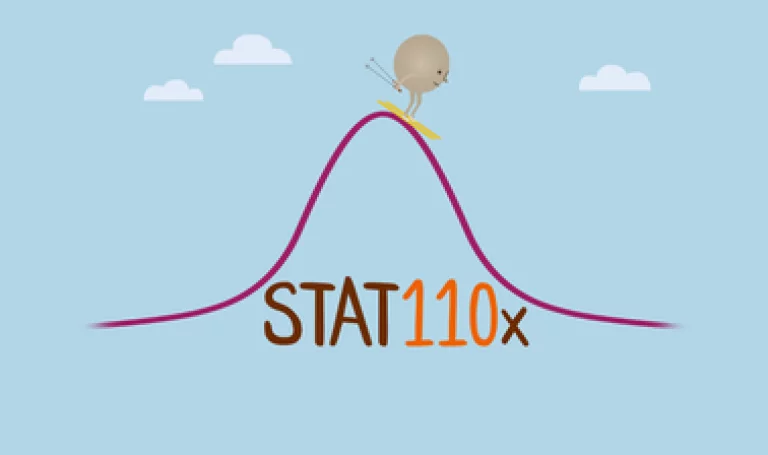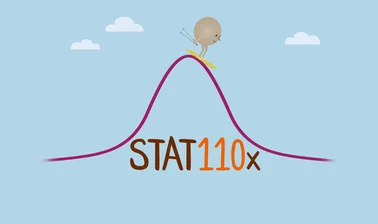
Add to wishlistAdded to wishlistRemoved from wishlist 0
Add to compare9.2/10
(Our Score)
Product is rated as #22 in category Data Science
Probability and statistics help to bring logic to a world replete with randomness and uncertainty. This course will give you tools needed to understand data, science, philosophy, engineering, economics, and finance. You will learn not only how to solve challenging technical problems, but also how you can apply those solutions in everyday life. With examples ranging from medical testing to sports prediction, you will gain a strong foundation for the study of statistical inference, stochastic processes, randomized algorithms, and other subjects where probability is needed.
Instructor Details
Votes: 0
Courses : 1
Specification: Introduction to Probability
|
18 reviews for Introduction to Probability
5.0 out of 5
★★★★★
★★★★★
18
★★★★★
0
★★★★★
0
★★★★★
0
★★★★★
0
Write a review
Show all
Most Helpful
Highest Rating
Lowest Rating
Add a review Cancel reply
This site uses Akismet to reduce spam. Learn how your comment data is processed.

| Price | Free |
|---|---|
| Provider | |
| Duration | 120 hours |
| Year | 2020 |
| Level | Intermediate |
| Language | English |
| Certificate | Yes |
| Quizzes | No |

Introduction to Probability
FREE






Bart –
The best courses I have taken. I have some prior experience but that is very rusty and definitely not as extensive as the topics in this course.
The professor has a very clear way of explaining the topics. There is hardly any repetition and a good balance of proving and not proving concepts using math.
The best aspect about this course are the exercises. They are a valuable learning tool in themselves. Most exercises use sub answers and the problem often progresses to a more complex problem yielding in depth understanding of the material.
Many exercises can only be submitted once or twice which keeps me alert while learning and applying the knowledge. I consider this a good thing, but not everyone agrees on that. The Professor and TA’s do an excellent job replying in the exercise forums where needed with the focus on increasing understanding.
It is a difficult course. Most people put in more than 12 hours per week. The fora show both grateful students because of the rigor and depth of the course and on the other side of the spectrum complaints about the amount work, it being too much for people with a full time job and family.
It starts of easy, but workload and complexity increase over time.
I highly recommended this one, but make sure you allot some time to keep up.
Hchan –
Many online courses are watered down in some way, but this one feels like a proper rigorous exercise driven course similar to what you’d get in person at a top school like MIT. The professors present concepts in lectures that have obviously been honed to a laser focus through years of pedogogical experience there is not a single wasted second in the presentations and they go exactly at the right pace and detail for you to understand the concepts. The exercises will make you work for your knowledge and are critical for really internalizing the concepts. This is the best online course I have taken in any subject.
Gregory J Hamel ( Life Is Study) –
6.041x: Introduction to Probability The Science of Uncertainty is a comprehensive 16 week introduction to probability offered by MIT through the edX MOOC platform. Although this course is dubbed an “introduction” it is not easy. You need familiarity with differential and integral calculus to understand some of the material, and the course can easily take 10 15 hours per week. Given its 16 week duration, the time commitment required to get through everything is much higher than the average MOOC. The course touches on all the major topics you need to gain a solid understanding of probability including basic axioms of probability, conditional probability and independence, discrete and continuous random variables, Bayesian inference and the probabilistic underpinnings of classical statistics. The course grade is based on lecture comprehension questions, weekly homework assignments, 2 midterms and 1 final exam. The midterms are worth 15% apiece and the final is worth 30% so good performance on the exams is paramount to getting a good score. You need a total of 60% to pass and it isn’t quite as easy to achieve that mark as it is in most MOOCs.
Weekly content consists of 2 4 lecture sequences covering different aspects of a particular topic in probability. Each lecture sequence contains about an hour of video in 5 to 15 minute segments and most video segments are followed by graded comprehension questions. The lecture videos themselves are crisp and the professor is good at explaining the material at a pace that doesn’t overload you with too much information too quickly. There can be quite a bit of mathematical notation on the screen at times, but it is well organized. Each week also has a series of solved problem videos where TAs walk you through applying the material in lecture to problems that are similar to those you will see in the homework. The solved problems sections add another 1 to 2 hours of video content per week.
Pure math courses usually aren’t that fun because they spend a lot of time dealing with proofs and theory and not so much time dealing with the real world. This course can be a slog at times because it is long and there is a lot to absorb and remember, but after building up the basic tools of probably in the first few weeks, later weeks focus on more interesting extensions and applications. You won’t find another intro to probability with greater depth and breadth. This course is best suited for technical and math minded people who will have to work with and apply probability in future coursework or in their professional lives. If you’re looking for an intro that just gets you up to speed on the rudiments of every day probability like coin flipping and dice rolling this course is overkill.
6.041x: Introduction to Probability is a great course for those serious about forming a solid foundation in probability. As professor Tsitsiklis states early on, “the first step in fighting an enemy like randomness is to study and understand your enemy.” At the end of this course you will be armed with the tools necessary to wage a well reasoned war against uncertainty.
I give 6.041x: Introduction to Probability 5 out of 5 stars: Excellent.
Siddharth Gupta –
This is the most beautifully designed course I have ever attended in my life, having completed first 4 weeks, it has been both rigorous and to the point. This course questions the whole pedagogy that I have faced in India. If someone fails to attempt the questions after the lectures, it is because of his inefficiency of grasping the concepts, the questions are designed in such a way that they would test your learning to the core.
Dolly Ye –
This course is very thorough and challenging.The learning curve could be steep at times,but don’t get frustrated.
The problem sets are structured to deepen your understanding of the materials.I partially completed it a year before,but taking it again makes me realize how important it is to review according to the forgetting curve. The course support is excellent too!
When you struggle with problem sets that “threatens” to fill your weekends,say this to yourself:
“Doing things we know how to do well is enjoyable, and that’s exactly the opposite of what deliberate practice demands. Instead of doing what we’re good at, we should insistently seek out what we’re not good at. Then we identify the painful, difficult activities that will make us better and do those things over and over. If the activities that lead to greatness were easy and fun, then everyone would do them and they would not distinguish the best from the rest. The reality that deliberate practice is hard can even be seen as good news. It means that most people won’t do it. So your willingness to do it will distinguish you all the more.” by Geoff Colvin from “Talent is Overrated”
Personal story
In China,math is the ticket to a good life.Most Chinese children from middle class background (actually, even Chinese parents who struggle to make ends meet would put their child’s education above everything) have at least been exposed to Olympiad level math by the age of 10 since it gives them a significant edge in the city wide middle school admission. I opted out of the program at the age of 11 after two years of understanding every word but not the whole sentence emerged out of the thin mouth of the teacher with a sphinxlike smile at the specialized weekend school for math and staying up to 1 am with my grandma (who also struggled to solve 5th grade Olympiad math problems despite graduating from medical school and generally considered intelligent) to finish assignments when everybody else seemed to do well in the class and had a normal childhood.
I need to point out that despite the tragic aura of my story, according to some of my friends,the specialized math program are the best part about childhood;it made them feel special or that they got where they are because of the foundational experience.
In China,contrary to the US,to be cool and popular,you need to excel in math and science.Your life depends on it.I can’t think of one single guy whom a lot of girls have crushes is not a certified academic superstar.Caveat:From zero to one,look is still critical.
It was also the year that I started thinking about finding my comparative advantage in a zero sum game (school admission) teeming with math geniuses who swallow math books with the same voracity I read fictions.I haven’t found out yet.Talk about inequality.
I went to an okish middle school and worked so hard in the first two years that I have not been able to approach the same intensity. I neglected personal hygiene to memorize one more English word or solve one more physics problem.During our mandatory morning run around the playground (800 meters) ,I took my Chinese textbook with me so I could squeeze another poem into my hippocampus.I used torchlight during compulsory school talent show to read. I threatened to cut myself when my mom forced me to go to nonacademic events.Unsurprisingly,I was routinely the top ten in a class of 550 people.Thinking back,I was driven by fear that I would become mediocre like the rest of my peers.Chinese education system is engineered in such as way that a student is encouraged to link her self worth with academic achievement.It could cause tremendous distress to those who have less than stellar grades.
After getting in the best high school in a city of 10 million people,I got 71/100 on the first physics midterm,which was way below the class average of 80.I remember asking the student who got 100 about how he did it.He said that he simply studied two weeks in advance and did all the problems in all the available practice books(like 4).Remember that our course load for tenth grade is 9 classes.Even if he was not smarter than me (at least in physics) before he did all the practice problems,he definitely was smarter after putting 10 more hours each week on the subject for 3 months.Now he’s a physics major in a prestigious university in China.
Physics and maths,except at the Olympiad level,is solely a matter of will and hard work. There is no talent to speak of, since the materials are presented in such a way that a person with a normal brain has enough processing power to understand and apply.
Enough personal background. My point is that even though I had certified intellectual disability at the age of 11*,it helped me build up a high tolerance for the very real physical pains of making incremental progresses on grasping abstract concepts or solving hard problems.
In an age of increasing distraction and automation, the only way to stay competitive is to work with the problems that you want to bang your head against the wall.That’s the right level of intellectual challenge that will rewire your brain and make you a better problem solver.
*In the ultra competitive Chinese system,not being exceptionally talented and hardworking could be considered a handicap since you are not gonna get in the best middle school and so on;the best universities in China has admission rate like 0.001 to 1 percent depending on whether you are from Beijing or not since universities differ only in selectiveness;the hardest to get in is the best.
Soumyadeep Roy –
This is my 2nd online course from MIT. It’s indeed the best introduction to probability theory I’ve ever had. I had no intuition about the subject,and moreover I used to think it’s something which can’t be done by myself. But as the course is going on, I’m finding myself not only good in probability,and it has also created a love for probabilistic models that ,I guess,truly govern everything around us. Enjoying so far : )
Jiting Tian –
This is an introductory course on probability theory, but, it’s very hard (after all, it’s from MIT). The materials, which have covered all the related topics on probability, are organized quite well and illustrated in a gradual and clear way. A lot of difficult exercises are required, but they are very useful to help students understand the concepts and master the calculation ways. The whole course lasts for 16 weeks (oh my god!), but when I insist on to the end, I have learnt so much and feel so satisfied. Thank you, Prof. John Tsitsiklis and the course staff!
Antonello L. –
This course is simply close to the perfection: the content is super, challenging and rigorous, but with every question/doubt I come up in my mind straight ahead answered by the lecturer. How did he know that I had that precise question ?
Exercises are really challenging, not obvious and not “just compute” stuff, but they really “teach” something themselves, showing the concepts introduced in the lectures in different prospectives.
The form is also perfect, with a video of the lecturer to introduce each topic and then the focus goes directly on the slides, with the lesson divided in short segments plus quizzes to reinforce learning. I can see there has been lot of work on the “form” (but not on the content that I tested it is exactly the same) from the first version of the course published on the OCW, where the lectures there were “just” registrations of the actual class lessons. This reinforce a more general tough, that when moving an activity online, to take advantage of the new media, you have to adapt your processes to the new media and not just copy what you were used to do offline.
If I only miss something, on the side of the content is a bit of linear algebra (matrix calculus).. why I understand it is not required for the course, sometimes it comes very natural, like when speaking of independence between random variables.. On the form instead (but this is a limit of edX, not the course itself) the forum software really sucks, and I guess this is why it is very little used. It should deserve a deep redesign !
Overall a great course that opened my mind to a full new world ! Thank you !
Anonymous –
Tsitsiklis is an absolutely superb teacher, especially when you can speed him up to 1.5, and he presents the most clear and thorough elementary probability class sequence that I have encountered. It’s in my top three MOOCs of all time.
Harish Ramakrishnan –
One of the best ever MOOCs. Very challenging. This should be in top 10 MOOCs of all time. Overall it is worth all the time we invest
Anonymous –
This was one of the best online courses which I have done. I learnt so much in the topics covered and enjoyed solving tough problems!
Vikas Kumar –
This is one of the best online courses that I have taken so far. The course is really hard and challenging and that makes it fun!
I got a very good support on the discussion forums and that really helped me think through some of the tough problems. Really thankful to Edx and MIT for this awesome course.
Prashant Singh –
Its a very good course which deals with concepts.
Quizzes tests your understanding.
Requires good books for help.
Requires effort.
High quality video .
High quality quizzes.
But I feel some concepts could be explained easily.
Jinqiang Zhang –
I tried 2 or 3 times for the course, it’s very hard. It’s hard because it has more content than a usual probability course. The professor is very good, nice accent, smart guy.
It’s good to have some calculus knowledge prior to this course, because you don’t want to handle the difficulty from the course itself, as well as the technique issue from calculus. At the end of the course, the classical part of the probability is quite different from the front parts, I don’t feel I had a firm grasp of the ideas, I guess at some point I need to revisit this part.
Anonymous –
I am taking a graduate version of the course numbered MITx 6.431 to end at the end of Dec’18. It is the best MOOC I have ever taken. In fact, given what is generally thought of MOOC in terms of rigour, and level of difficulty, this course is nothing like an ordinary MOOC. Rigour is at the same level as you might expect in an excellent graduate level course taken on campus.
Having experienced this course, I can confidently say that advanced degrees can be offered fully online at the highest level of academic excellence. There is only one aspect that I feel unsatiated about and is the constraint of not having some one on one time with an instructor or TA and white board a concept that one may want to understand truly deeply.
Remarkable!
Luiz Cunha –
Maybe my number 1 MOOC taken. This is top quality content. Highly recommended
Everything is good in this MOOC.
And it is kept being updated
Federico Carrone –
This is a great introducing course on probability. A certain level in math is a prerequisite, but nothing complicated. The teacher is clear and the his explanations really help to understand notion that can appear complicated at first glance. The exercices are designed to help the understanding. They’re not “challenging”, but are helpful.
Anonymous –
This course is really a legend! It’s very challenging but professor explained all the things so well and smoothly. I have taken a course in probability and found it so hard that I cannot understand a lot of theory. But through this course, I really understand a lot.